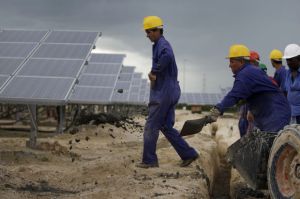Originally published May 2015 in Liberation Newspaper.
In cities across the United States and around the world, people are fed up and demanding action to reverse the environmental crisis facing humanity. From deadly gas leaks and oil spills to fracking, pollution and water shortages, it is becoming clearer and clearer that the planet is losing its ability to sustain society under the existing capitalist system.
Although the rich and powerful have bitterly opposed the environmental movement, there is a type of rhetoric that is now accepted in mainstream ruling-class opinion. “Going green”—adopting superficial policies that limit an individual’s “carbon footprint”—is in most cases an officially encouraged practice.
While developing a more environmentally friendly culture can make a cumulative impact and is important, the problem is far deeper than the use of plastic bags or the wrong light bulbs. We need to go to the roots of this society’s economic model to find a solution to the urgent threats facing the planet.
Environmental destruction inevitable under capitalism
Karl Marx showed that while the economic system of capitalism, based on private property and the pursuit of profit, had revolutionized the productive forces and social relations, it would become over time a restraint to human progress, a contradiction which would lead sooner or later to a social revolution.
Because capitalism expands production for its own sake—based on competition and profit—it is incapable of meeting the challenge of fossil fuels. The “life-blood” of modern capitalist industry and transportation is carbon-based energy sources—coal, oil and natural gas (methane) plus, increasingly, crops grown not for food but for biofuel (ethanol).
Since 1750, just prior to the start of the Industrial Revolution, levels of carbon dioxide in the atmosphere have grown from 280 parts per million to today’s level of around 400 ppm, closely tracking the level of industrial development over that period. This surge is what has led the Earth’s average global surface temperature to rise.
The amount of carbon dioxide in the atmosphere must be reduced to at least 350 ppm, according to leading climate scientist James Hansen, to halt the global warming trend and prevent a global catastrophe in which large areas of the planet become uninhabitable.
The case for taking action to prevent climate catastrophe is strong. But those historically responsible for the bulk of the emissions, the Western capitalist countries, are unwilling to make any meaningful changes because economic production is controlled by large corporations and banks, not a people’s government. For those who control the productive enterprises, everything is about next quarter’s profit statements—not the health of the people or the planet.
Socialism and a planned economy
There is another way. Cuba has shown that it can be done. Cuba was designated by the World Wildlife Fund as the only sustainably living nation on Earth. This means that the country is meeting the health and education needs of its people while not exceeding its ecological footprint. While Cuba’s environmental progress is often portrayed as an accidental if ingenious response to embargo restrictions and the consequences of the collapse of the Soviet Union, the many conscious and well-thought-out policies and laws that have been passed over the years to protect Cuba’s environment should not be forgotten.
Most of all, Cuba has a planned economy. Instead of important economic decisions being made by a tiny group of super-rich capitalists, in a country like Cuba, goods are produced and distributed according to a plan based on cooperation rather than the exploitation of labor. Cubans have input into their economic plan through neighborhood and workplace assemblies, as well as mass organizations representing constituencies such as women, students, farmers and workers.
With profit out of the picture, the people of Cuba can make decisions on the basis of human needs. Cuba has been able to implement policies that defend the environment because the country had a revolution and is dedicated to building socialism—where the well-being of people and of the long-term health of the planet takes precedence over short-term gain. This system can exist in the United States and every other country too, but it will take a fundamental shift of power away from the bankers and CEOs and into the hands of working and oppressed people.







